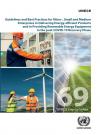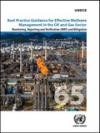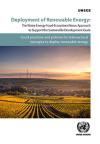Publications
Displaying Results 21 - 40 of 77
- Pусский
- Français
- English
Promoting Energy Efficiency Standards and Technologies to Enhance Energy Efficiency in BuildingsECE Energy Series No. 60Geneva, 2020Buildings today are responsible for approximately one third of total final energy consumption and account for almost 40 percent of carbon dioxide emissions. Advanced technical solutions
- English
Towards sustainable renewable energy investment and deployment. Trade-offs and opportunities with water resources and the environment (advance version of December 2019)Renewable energy technologies can be used to improve access to water and
- English
The Best Practice Guidance for Effective Methane Recovery and Use from Abandoned Coal Mines (BPG on AMM) is aimed at raising awareness
- English
The Best Practice Guidance for Effective Methane Recovery and Use from Abandoned Coal Mines (BPG on AMM) is aimed at
- English
The Best Practice Guidance for Effective Methane Recovery and Use from Abandoned Coal Mines (BPG on AMM) is aimed at raising
- English
Hard Talks in ECE Countries on How to Increase Renewable Energy UptakeThis publication explores the outcomes of Hard Talks carried out in Azerbaijan, Bosnia and Herzegovina, Georgia, Kazakhstan, Serbia and Ukraine, from 2016 until early 2019. The study provides an outline of
- English
The document provides guidance for developing and implementing effective practices for monitoring, reporting and verifying (MRV) methane emissions from the oil and gas sector. It also provides guidance on remediation practices. The document is meant to serve as a resource for a broad audience, including owners and operators of oil and gas facilities and policymakers at all levels of government.
- English
- English
Status and Perspectives for Renewable Energy Development in the UNECE Region 2017The UNECE and the German Energy Agency (dena) have joined forces to issue this report, which features good practices for and experiences of renewable energy policymaking. All countries can benefit from the
- English
- English
Coordinated Operations of Flexible Coal and Renewable Energy Power Plants: Challenges and Opportunities ENERGY SERIES No. 52 This report argues that coordinated operations of renewable energy and fossil fuel- red power plants could help increase reliability and eciency of the whole system. At the same time, given the inherent
- English
- English
The United Nations Economic Commission for Europe (UNECE) and Renewable Energy Policy Network for the 21st Century (REN21) issued the REN21 UNECE Renewable Energy Status Report 2017. The UNECE Renewable Energy and Energy Efficiency Status Report 2017 provides a comprehensive overview of the current
- English
The water-energy-food-ecosystems nexus approach comes in with the objective of promoting coordination and integrated planning and sustainable management of interlinked resources across sectors, which could speed up the achievement of the 2030 Agenda for Sustainable Development. The nexus could leverage deployment of renewable energy across the Goals. The meaning of “nexus”, in the context of
- English
Experience in the Europe & CIS Region with Clean Energy -UNDP, GEF and UNECEThe sixth day of October 2016 was a historic day for global efforts to combat climate change. The Paris Agreement entered into force as more than 55 countries representing 55% of total global greenhouse gas emissions have now
- English
Energy Efficiency – Getting more from less (Booklet - December 2015)Improving energy efficiency contributes to energy security, better environment, quality of life, and economic well-being for all. Energy efficiency is called “the first fuel” as it is the best way of getting more out of existing resources
- English
Carbon Capture and Storage – A Key to Climate Change Mitigation (Booklet - December 2015)If the world is to succeed in constraining CO2 emissions to levels consistent with a less than 2°C rise in global temperatures, then carbon capture and storage (CCS) will need to contribute about one-sixth of needed CO2 emission
- English
Cleaner electricity production from fossil fuels - Booklet December 2015Electricity generation through the use of fossil fuels has been a foundational pillar for modern society. Over two thirds of the world’s electricity is generated using fossil fuels. The power sector was designed around fossil fuels


















